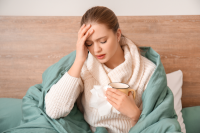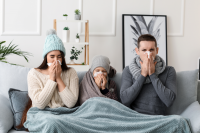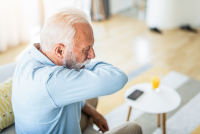Respiratory Viruses
Many respiratory viruses, like influenza (flu), COVID-19, and respiratory syncytial virus (RSV), circulate year-round in the US and California, typically with more activity in fall and winter (October – March).
Respiratory viruses can cause cold or flu-like symptoms, and can be more serious in some people. They are typically spread by direct contact with a person who has a respiratory virus (through coughing or sneezing) or indirect contact with a person who has a respiratory virus (from items an infected person touched).
How Can I Protect Myself and My Community?
You can use strategies and tools to lower your chances of catching a respiratory virus and reduce your likelihood of getting very sick if you do catch one. These actions can also help lower your chances of spreading a respiratory virus, including to others at higher risk of severe illness.
- Stay up to date on vaccines: Vaccines are the best way to protect against severe illness and death. Flu, COVID-19, and RSV immunizations are available now, and you can get them at the same time. Visit MyTurn.ca.gov or talk to a health care provider to schedule your appointment.
- Seasonal flu & COVID-19 vaccines are available for:
- Everyone 6 months and older.
- RSV immunization is now available and recommended:
- All infants younger than 8 months
- Infants/toddlers 8 through 19 months at high risk for severe RSV.
- People who are pregnant at 32 to 36 weeks of pregnancy
- Adults 60 years and older
- Seasonal flu & COVID-19 vaccines are available for:
- Stay home if you're sick: Staying home when you’re sick slows the spread of flu, RSV, COVID-19, and even the common cold.
- Test and treat: Test for COVID-19 and flu if you have symptoms (like fever, cold, cough, sore throat, loss of taste or smell, stomach issues). If you test positive, contact your health care provider, and ask about medications. Medications work best when started right after symptoms begin. Learn more about COVID-19 treatments.
- Consider wearing a high-quality mask (N95, KN95, KF94), especially if you’re sick and in crowded or indoor areas. For more information, visit When and Why to Wear a Mask.
- Wash your hands: Wash hands throughout the day with soap and warm water for at least 20 seconds. If soap and water are not available, use a hand sanitizer with at least 60% alcohol.
- Cover your cough or sneeze: Cough or sneeze into your elbow, arm, or a disposable tissue. Make sure to throw away your tissue then wash or sanitize your hands.
Who is at Higher Risk for Serious Illness?
Anyone can get a respiratory virus like COVID-19, flu and RSV, but some people have a higher risk of getting very sick, including:
- Older adults: As people get older, they are more likely to have underlying health conditions and weakened immune systems. The risk of getting very sick and dying from respiratory viruses increases with age.
- Younger children: The immune systems of infants and young children are still developing. Their lungs and airways are smaller, making viruses that affect the airways more dangerous. This risk is usually highest early in infancy and lessens as children grow and get older.
- People with weakened immune systems: This includes people taking medicines after an organ transplant or people with certain cancers. This is because they have lower ability to fight off viruses, and their bodies may have a harder time building strong protection from an immunization or past illness.
- People with disabilities: People with disabilities are at increased likelihood of having underlying health conditions and may be at higher risk because of social determinants of health.
- People who are pregnant: Pregnancy changes a person's immune system and places stress on the body, making it more difficult to fight off an illness.
- People with certain underlying health conditions such as chronic lung disease (like asthma), heart disease, or obesity.


 COVID-19
COVID-19 Flu
Flu RSV
RSV